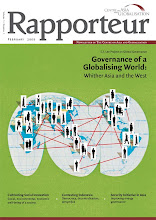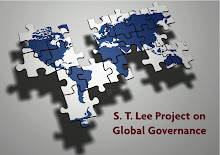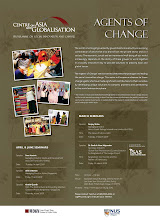 Professor Tommy Koh is Ambassador-At-Large at the Ministry of Foreign Affairs, Singapore, Chairman of the Institute of Policy Studies at the Lee Kuan Yew School of Public Policy and the National Heritage Board. Professor Koh shares his views on key trends in global governance, how should Asia and Southeast Asia be more engaged in global governance, what to expect from Obama Administration and finally the EU’s role in global governance.
Professor Tommy Koh is Ambassador-At-Large at the Ministry of Foreign Affairs, Singapore, Chairman of the Institute of Policy Studies at the Lee Kuan Yew School of Public Policy and the National Heritage Board. Professor Koh shares his views on key trends in global governance, how should Asia and Southeast Asia be more engaged in global governance, what to expect from Obama Administration and finally the EU’s role in global governance.Q. What are your assessments of the key trends shaping global governance?
The first key trend is the speed, breadth and depth of globalization. We have become inter-connected and, to varying degrees, inter dependent. What happens in one part of the world will have an impact on other parts of the world. The current global financial and economic crisis started in Wall Street and in the US, but, it spread very quickly, across the Atlantic, to Europe, and then to the rest of the world. So, because of globalization, an American crisis has become a global crisis.
The second key trend is that many of our global challenges cannot be solved by any single country, no matter how powerful, or by a group of like-minded countries. They can only be solved by all the countries of the world, working together. Take global warming and climate change as an example. It is a problem which cannot be solved by the US alone or by a group of like-minded States comprising the US, Europe and Japan. It can only be solved by a new international consensus, supported by all the countries of the world, including China and India.
The third key trend is the growing deficit between the world’s need for global governance and the inadequacies of the status quo. I am glad that the LKY School has launched the ST Lee Project to address this problem.
Q. How is global governance conceived in Southeast Asia and what role can this region play in global governance?
Southeast Asia is one of the most globalized regions of the world. It is a region which does not reject globalization but welcomes it. It seeks to harness the opportunities presented by the bright side of globalization and to cope with the challenges released by the dark side.
The region plays a positive and pro-active role in global governance through its regional organization, ASEAN, and through other regional organizations, such as, ASEAN Regional Forum, ASEAN+3, the East Asia Summit and through such inter-regional forums as APEC, the Asia-Europe Meeting, Forum of East Asia and Latin-America and the Asia-Middle East Dialogue.
ASEAN also plays an active role at the global level, at the UN, WTO, WHO, IMO, ICAO, UNEP, etc. ASEAN is aware of the deficit in global governance. It will work cooperatively with other regions of the world to reduce and, if possible, erase that deficit.
Q. What contributions can Asia make to global governance?
Asia is a major beneficiary of globalization. Asia is also a region of growing prosperity. Asia must, therefore, behave as a responsible stakeholder and not as a free rider. What does “responsibility” mean?
First, it means that Asia should be generous in sharing its wealth, knowledge, expertise and experience with other less developed regions of the world. Japan’s generous ODA is a laudable example. The current efforts by China and India to help Africa develop its infrastructure is another example.
Second, Asia should shoulder a larger burden in helping the world to maintain international peace and security, such as, in peace-keeping missions.
Third, Asia should contribute leadership and intellectual capital to global governance. It is not enough for Asia to contribute money, eg “cheque book diplomacy” or provide “arms and legs”, eg sending troops to UN peace-keeping missions. We must also provide the world with Asian leadership and Asian ideas.
Q. What role would you like the US to play in global governance in our multi-polar world?
I think the Obama Administration would probably agree that we no longer live in a unipolar world. The world has become increasingly multi-polar. It is, however, also true that not all the poles are equally powerful. The US is, in every respect, the most powerful country in the world. Whether you love or hate the US, you will probably agree that the US is the indispensable leader of the world. Few enterprises will succeed without the participation and support of the US.
My vision is for the US to return to its historic role of world leader. My hope is that the US will seek to translate its overwhelming power into moral leadership; that the US will lead but not dictate; that it will respect international law and international institutions; and that it will resort to the use of force only as the last resort. The US leads best when it leads by example.
Q. What is your view on Europe’s role in global governance?
Europe suffers from a bad press in Asia. There is inadequate appreciation in Asia of the miracle which the EU represents. One only has to compare Europe in the two halves of the 20th Century to understand my point.
The EU is an expanding oasis of peace and prosperity in Europe. Europe is not a fortress but is open to the world. When drafting the ASEAN Charter in 2007, my colleagues and I often looked to the EU for inspiration. Europe has an important leadership role in all aspects of global governance and not just in setting new norms. Let me give some examples of the kind of leadership which we would like to see more of. The former President of Finland, Maarti Ahtisaari, brought peace to Aceh. The EU and ASEAN provided observers to oversee the process of disarmament and reconciliation. Another European, Pascal Lamy, is head of the WTO and is driving the desperate quest for a successful conclusion to the Doha Round of multilateral trade negotiations. The EU took the initiative to propose the convening of the G20 Summit, in Washington, in September 2008, to address the global financial and economic crisis.
The EU also took the initiative to convince the UN Security Council to authorize the use of naval power to combat the Somali pirates preying on ships off the Gulf of Aden. I therefore believe that Europe has played and will continue to play a constructive leadership role in global governance.
This interview was first published in the February 2009 edition of Rapporteur - CAG Newsletter.










No comments:
Post a Comment